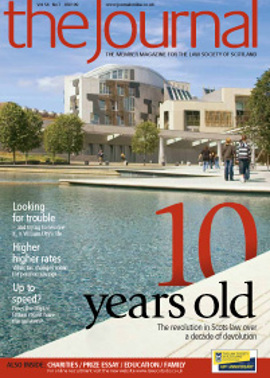Solicitor advocates: the future
Among the thorny questions affecting our profession, apart from the forthcoming review of the civil courts, is the future of the solicitor advocate branch.
The issue has run since the adverse comments by the judges in the Woodside appeal. Criticisms were also made of solicitor advocates in England by a judge in a criminal trial, which attracted the attention of the Law Society of England & Wales as being unfair.
We now have the promise of a review in Scotland, following calls not only from the bench, but also from the Society of Solicitor Advocates and the Law Society of Scotland itself, of the professional rules of conduct for solicitor advocates and their role in the legal profession.
I myself am a solicitor engaged in civil litigation, most usually with personal injury actions in the Court of Session. I do not wish to qualify as a solicitor advocate.
I do not instruct solicitor advocates because there are none in my firm, but also because I am happy to use the independent expertise of the Scottish bar. I have a lot of confidence in the expertise, independence and service that I will get from advocates.
There are various changes to the legal profession in Scotland that might in future affect the viability of parts of the Scottish bar. Depending on the recommendations for civil justice reform, it is possible that it may no longer be feasible for counsel to continue to specialise in personal injury cases.
I for one would not like to lose the services of counsel and I think that many solicitors throughout Scotland would not wish to be without the opportunity to instruct excellent counsel in personal injury cases.
Some of the criticisms made by the bench in criminal cases have concerned solicitors instructing solicitor advocates within the same firm (a partner instructed by a more junior solicitor may also be the employer of that junior person), and at least on the face of it there is potential for conflict of interest between a solicitor advocate and the instructing solicitor where both come from the same firm. There is no such conflict between a solicitor and counsel.
Many personal injury cases in Scotland are run under union-referred legal assistance schemes. However, in an essay for Scolag published in late 2007, one of the most eminent senior counsel in Scotland for injured pursuers, described the present condition of many such schemes as: “whereas trade unions used to pick up the bill for expenses in the event that a member’s action was lost, most of them now no longer do so, acting merely as ‘referral agencies’ to the small number of firms of solicitors whom they instruct”. In such cases solicitors’ firms are effectively acting speculatively.
At least one advocate of my acquaintance has asked how a solicitor advocate in a personal injury case, who is a partner in the same firm that has instructed him or her, can truly be seen to be independent if the firm has a financial interest in the outcome. No one is suggesting that abuse happens, but the potential conflict exists.
Similar questions arise perhaps in commercial litigation cases.
How would it be if the professional obligation on the solicitor advocate meant that they had to advise the client that the firm of solicitors had been negligent, for example?
Of course, such situations may never or rarely arise, depending on the expertise of the firms and of the solicitor advocates, but justice and the independence of the branches of the legal profession must be maintained and be seen to be maintained. These are some of the issues which the greater use of solicitor advocates is bringing into focus.
There has also been mention of appointing greater numbers of solicitor advocates as senior counsel, and I for one would want to be satisfied in my own mind that the senior solicitor advocates had done the very large number of proofs and trials which somebody acquiring senior counsel status at the Scottish bar has traditionally had to demonstrate.
All in all, we require much greater discussion about solicitor advocates and their role and professional duties. The Scottish and English bench have surely been right to call for a general debate of the future of solicitor advocates.
In this issue
- Solicitor advocates: the future
- For the love of it
- Not to be denied
- Ten years on
- Never say never
- MD becomes new Keeper
- Whose view prevails?
- Scant relief?
- The greater good
- Twenty out of ten
- First class
- Clean break
- Ask Ash
- Not quite switched on
- Beware salary waiver tax traps
- Road to recovery?
- ASBOs: what standard?
- Scotland the unready
- The limits of listing
- Debt traps
- Tread warily
- Scottish Solicitors' Discipline Tribunal
- Website review
- Book reviews
- Procurement remedies take shape
- Clauses become more standard






